2018 FIFA World Cup
 From Wikipedia the free encyclopedia
From Wikipedia the free encyclopedia
| Чемпионат мира по футболу FIFA 2018 (Russian) Chempionat mira po futbolu FIFA 2018 | |
|---|---|
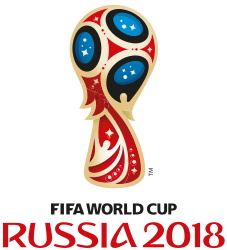 Играй с открытым сердцем Igray s otkrytym serdtsem "Play with an open heart" | |
| Tournament details | |
| Host country | Russia |
| Dates | 14 June – 15 July |
| Teams | 32 (from 5 confederations) |
| Venue(s) | 12 (in 11 host cities) |
| Final positions | |
| Champions | |
| Runners-up | |
| Third place | |
| Fourth place | |
| Tournament statistics | |
| Matches played | 64 |
| Goals scored | 169 (2.64 per match) |
| Attendance | 3,031,768 (47,371 per match) |
| Top scorer(s) | |
| Best player(s) | |
| Best young player | |
| Best goalkeeper | |
| Fair play award | |
← 2014 2022 → | |
The 2018 FIFA World Cup was the 21st FIFA World Cup, the quadrennial world championship for national football teams organized by FIFA. It took place in Russia from 14 June to 15 July 2018, after the country was awarded the hosting rights in late 2010. It was the eleventh time the championships had been held in Europe, the first time they were held in Eastern Europe, and the first time they were held across two continents (Europe and Asia). At an estimated cost of over $14.2 billion, it was the most expensive World Cup ever held until it was surpassed by the 2022 World Cup in Qatar.[1][2]
The tournament phase involved 32 teams, of which 31 came through qualifying competitions, while the host nation Russia qualified automatically. Of the 32, 20 had also appeared in the 2014 event, while Iceland and Panama each made their debut at the World Cup. 64 matches were played in 12 venues across 11 cities. Germany, the defending champions, were eliminated in the group stage for the first time since 1938. Host nation Russia was eliminated in the quarter-finals. In the final, France played Croatia on 15 July at the Luzhniki Stadium in Moscow. France won the match 4–2, claiming their second World Cup and becoming the fourth consecutive title won by a European team, after Italy in 2006, Spain in 2010, and Germany in 2014.
Croatian player Luka Modrić was voted the tournament's best player, winning the Golden Ball. England's Harry Kane won the Golden Boot as he scored the most goals during the tournament with six. Belgium's Thibaut Courtois won the Golden Glove, awarded to the goalkeeper with the best performance. It has been estimated that more than 3 million people attended games during the tournament.
Host selection
[edit]
The bidding procedure to host the 2018 and 2022 FIFA World Cup tournaments began in January 2009, and national associations had until 2 February 2009 to register their interest.[3] Initially, nine countries placed bids for the 2018 FIFA World Cup, but Mexico later withdrew from the proceedings,[4] and Indonesia's bid was rejected by FIFA in February 2010 after the Indonesian government failed to submit a letter to support the bid.[5] During the bidding process, the three remaining non-UEFA nations (Australia, Japan, and the United States) gradually withdrew from the 2018 bids, and thus all UEFA nations were ruled out of the 2022 bid. As such, there were eventually four bids for the 2018 FIFA World Cup, two of which were joint bids: England, Russia, Netherlands/Belgium, and Portugal/Spain.[6]
The 22-member FIFA Executive Committee convened in Zürich on 2 December 2010 to vote to select the hosts of both tournaments.[7] Russia won the right to be the 2018 host in the second round of voting. The Portugal/Spain bid came second, and that from Belgium/Netherlands third. England, which was bidding to host its second tournament, was eliminated in the first round.[8]
The voting results were:[6]
| Bidders | Votes | |
|---|---|---|
| Round 1 | Round 2 | |
| Russia | 9 | 13 |
| Portugal / Spain | 7 | 7 |
| Belgium / Netherlands | 4 | 2 |
| England | 2 | Eliminated |
Host selection criticism
[edit]
The choice of Russia as host was controversial. Issues included the high level of racism in Russian football,[9][10][11] human rights abuses by Russian authorities,[12][13] and discrimination against LGBT people in government (including gay propaganda laws) along with wider Russian society.[14][15] Russia's involvement in the ongoing conflict in Ukraine had also prompted calls for the tournament to be moved, particularly following the annexation of Crimea.[16][17] In 2014, FIFA president Sepp Blatter stated that "the World Cup has been given and voted to Russia and we are going forward with our work".[18]
Russia was criticised for alleged abuse of migrant labourers in the construction of World Cup venues,[19] with Human Rights Watch reporting cases where workers were left unpaid, made to work in dangerously cold conditions, or suffering reprisals for raising concerns.[20][21] A few pundits claimed it was slave labour.[22][23][24] In May 2017, FIFA president Gianni Infantino admitted there had been human rights abuses of North Korean workers involved in the construction of Saint Petersburg's Zenit Arena.[25] By June 2017, at least 17 workers had died on World Cup construction sites, according to Building and Wood Workers' International.[26][27] In August, a group of eight US senators called on FIFA to consider dismissing Russia as the World Cup host if an independent investigation verified allegations of North Koreans being subjected to forced labor.[28]
Racism and Neo-nazi symbols displayed in the past by some Russian football fans drew criticism,[29] with documented incidents of racial chants, banners spewing hate-filled messages, and sometimes assaults on people from the Caucasus and Central Asia.[30][31] In March 2015, FIFA's then Vice President Jeffrey Webb said that Russia posed a huge challenge from a racism standpoint, and that a World Cup could not be held there under the current conditions.[32] On July, United Nations anti-discrimination official Yuri Boychenko said that Russian soccer authorities had failed to fully grasp what racism was and needed to do more to combat it.[33] To address this as well as concerns of hooliganism in general, Russian intelligence services blacklisted over 400 fans from entering the stadiums by June 2018, with 32 other countries also sending officers to help local police screen attendees for valid ID cards.[34]
Allegations of corruption in the bidding processes and concerns over bribery on the part of the Russian team and corruption by FIFA members for the 2018 and 2022 World Cups led to threats from England's FA to boycott the tournament.[35] They claimed that four members of the executive committee had requested bribes to vote for England, and Sepp Blatter had said it had already been arranged before the vote that Russia would win.[36] FIFA appointed Michael J. Garcia, a US attorney, to investigate and produce a report on the corruption allegations. Although the report was never published, FIFA released a 42-page summary of its findings as determined by German judge Hans-Joachim Eckert. Eckert's summary cleared Russia and Qatar of any wrongdoing, but was denounced by critics as a whitewash.[37] Because of the controversy, the FA refused to accept Eckert's absolving Russia from blame. Greg Dyke called for a re-examination of the affair and David Bernstein called for a boycott of the World Cup.[38][39] Garcia criticised the summary as being "materially incomplete" with "erroneous representations of the facts and conclusions", and appealed to FIFA's Appeal Committee.[40][41] The committee declined to hear his appeal, so Garcia resigned to protest of FIFA's conduct, citing a "lack of leadership" and lack of confidence in Eckert's independence.[42]
On 3 June 2015, the FBI confirmed that federal authorities were investigating the bidding and awarding processes for the 2018 and 2022 World Cups.[43][44] In an interview published on 7 June 2015, Domenico Scala, the head of FIFA's Audit And Compliance Committee, stated that "should there be evidence that the awards to Qatar and Russia came only because of bought votes, then the awards could be cancelled".[45][46] Prince William of Wales and former British Prime Minister David Cameron attended a meeting with FIFA vice-president Chung Mong-joon in which a vote-trading deal for the right to host the 2018 World Cup in England was discussed.[47][48]
Teams
[edit]Qualification
[edit]For the first time in the history of the FIFA World Cup, all eligible nations—the 209 FIFA member associations except automatically qualified hosts Russia—applied to enter the qualifying process.[49] Zimbabwe and Indonesia were later disqualified before playing their first matches,[50][51] while Gibraltar and Kosovo, who joined FIFA on 13 May 2016 after the qualifying draw but before European qualifying had begun, also entered the competition.[citation needed] Places in the tournament were allocated to continental confederations, with the allocation unchanged from the 2014 World Cup.[52][53] The first qualification game, between Timor-Leste and Mongolia, began in Dili on 12 March 2015 as part of the AFC's qualification,[54][55][56] and the main qualifying draw took place at the Konstantinovsky Palace in Strelna, Saint Petersburg, on 25 July 2015.[57][58]
Of the 32 nations qualified to play at the 2018 FIFA World Cup, 20 countries competed at the previous tournament in 2014. Both Iceland and Panama qualified for the first time, with the former becoming the smallest country in terms of population to reach the World Cup.[59] Other teams returning after absences of at least three tournaments included: Egypt, returning to the finals after their last appearance in 1990; Morocco, who last competed in 1998; Peru, who last appeared in 1982; Senegal, competing for the second time after reaching the quarter-finals in 2002. Poland, Saudi Arabia, Tunisia and Sweden have also returned after 12 years. It was the first time three Nordic countries (Denmark, Iceland and Sweden) and four Arab nations (Egypt, Morocco, Saudi Arabia and Tunisia) qualified for the World Cup.[60]
Notable teams that failed to qualify included: four-time champions Italy (for the first time since 1958), who were knocked out in a qualification play-off by quarter-finalists Sweden and were the highest-ranked team to not qualify; and the Netherlands, who were three-time runners-up and had finished in third place in 2014, had qualified for the last three World Cups, and failed to qualify for their second major tournament in a row, missing out on the UEFA Euro 2016 as well. Four reigning continental champions: 2017 Africa Cup of Nations winners Cameroon; two-time Copa América champions and 2017 Confederations Cup runners-up Chile; 2016 OFC Nations Cup winners New Zealand; and 2017 CONCACAF Gold Cup champions the United States (for the first time since 1986) also failed to qualify. The other notable qualifying streaks broken were for Ghana and Ivory Coast, both of which had qualified for the three previous tournaments.[61] The lowest-ranked team to qualify was the host nation, Russia.
Note: Numbers in parentheses indicate positions in the FIFA World Rankings at the time of the tournament.[62]
| AFC (5)
CAF (5)
| CONCACAF (3)
CONMEBOL (5) OFC (0)
| UEFA (14) |  Qualified Did not qualify Disqualified Not a FIFA member
|
Draw
[edit]
The draw was held on 1 December 2017 at 18:00 MSK at the State Kremlin Palace in Moscow.[63][64] The 32 teams were drawn into eight groups of four, by selecting one team from each of the four ranked pots.
For the draw, the teams were allocated to four pots based entirely on the FIFA World Rankings of October 2017. Pot one contained the hosts Russia (who were automatically assigned to position A1) and the best seven teams. Pot two contained the next best eight teams, and so on for pots three and four.[65] This was different from previous draws, when only pot one was based on FIFA rankings while the remaining pots were based on geographical considerations. However, teams from the same confederation still were not drawn against each other for the group stage, except that two UEFA teams could be in each group. The pots for the draw are shown below.[66]
| Pot 1 | Pot 2 | Pot 3 | Pot 4 |
|---|---|---|---|
Squads
[edit]Initially, each team had to name a preliminary squad of 30 players, but in February 2018 this was increased to 35.[67] From the preliminary squad, the team had to name a final squad of 23 players (three of whom had to be goalkeepers) by 4 June. Players in the final squad could be replaced for serious injury up to 24 hours prior to kickoff of the team's first match. These replacements did not need to have been named in the preliminary squad.[68]
For players named in the 35-player preliminary squad, there was a mandatory rest period between 21 and 27 May 2018, except for those involved in the 2018 UEFA Champions League Final played on 26 May.[69]
Officiating
[edit]On 29 March 2018, FIFA released the list of 36 referees and 63 assistant referees selected to oversee matches.[70] On 30 April 2018, FIFA released the list of 13 video assistant referees, who acted solely in this capacity in the tournament.[71]
Referee Fahad Al-Mirdasi of Saudi Arabia was removed on 30 May 2018 over a match-fixing attempt,[72] along with his two assistant referees, compatriots Mohammed Al-Abakry and Abdulah Al-Shalwai. A new referee was not appointed, but two assistant referees, Hasan Al Mahri of the United Arab Emirates and Hiroshi Yamauchi of Japan, were added to the list.[73][74] Assistant referee Marwa Range of Kenya also withdrew after the BBC released an investigation conducted by a Ghanaian journalist which implicated him in a bribery scandal.[75]
Video assistant referees
[edit]Shortly after the International Football Association Board's decision to incorporate video assistant referees (VARs) into the Laws of the game (LOTG) on 16 March 2018, the FIFA Council took the much-anticipated step of approving the use of VAR for the first time in a FIFA World Cup tournament.[76][77]
VAR operations for all games were operated from a single headquarters in Moscow, which received live video of the games and were in radio contact with the on-field referees.[78] Systems were in place for communicating VAR-related information to broadcasters and visuals on stadiums' large screens were used for the fans in attendance.[78]
VAR had a significant impact on several games.[79] On 15 June 2018, Diego Costa's first goal against Portugal became the first World Cup goal based on a VAR decision;[80] the first penalty as a result of a VAR decision was awarded to France in their match against Australia on 16 June and resulted in a goal by Antoine Griezmann.[81] A record number of penalties were awarded in the tournament, a phenomenon partially attributed to VAR.[82] Overall, the new technology was both praised and criticised by commentators.[83] FIFA declared the implementation of VAR a success after the first week of competition.[84]
Venues
[edit]Russia proposed the following host cities: Kaliningrad, Kazan, Krasnodar, Moscow, Nizhny Novgorod, Rostov-on-Don, Saint Petersburg, Samara, Saransk, Sochi, Volgograd, Yaroslavl, and Yekaterinburg.[85] Each chosen city was located in European Russia (except Yekaterinburg,[86] which is located in Asia but lies very close to the Europe-Asia border) in order to reduce travel time for the teams in the huge country. The bid evaluation report stated: "The Russian bid proposes 13 host cities and 16 stadiums, thus exceeding FIFA's minimum requirement. Three of the 16 stadiums would be renovated, and 13 would be newly constructed."[87]
In October 2011, Russia reduced the number of stadiums from 16 to 14. Construction of the proposed Podolsk stadium in the Moscow Oblast was cancelled by the regional government. Also, in the capital, Otkritie Arena was competing with Dynamo Stadium over which would be constructed first.[88][dead link]
The final choice of host cities was announced on 29 September 2012. The number of cities was reduced further to 11 and the number of stadiums to 12 as Krasnodar and Yaroslavl were dropped from the final list. Of the 12 stadiums used for the tournament, three (Luzhniki, Yekaterinburg and Sochi) had been extensively renovated and the other nine were brand new; $11.8 billion was spent on hosting the tournament.[89]
Sepp Blatter had said in July 2014 that, given the concerns over the completion of venues in Russia, the number of venues for the tournament may be reduced from 12 to 10.[90] He also said, "We are not going to be in a situation, as is the case of one, two or even three stadiums in South Africa, where it is a problem of what you do with these stadiums".[91]
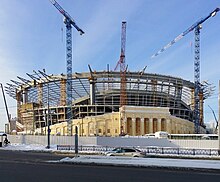
In October 2014, on their first official visit to Russia, FIFA's inspection committee and its head, Chris Unger, visited St. Petersburg, Sochi, Kazan and both Moscow venues. They were satisfied with the progress.[92] On 8 October 2015, FIFA and the local organising committee agreed on the official names of the stadiums to be used during the tournament.[93] Of the twelve venues, the Luzhniki Stadium in Moscow and the Saint Petersburg Stadium—the two largest stadiums in Russia—were used most; both hosted seven matches. Sochi, Kazan, Nizhny Novgorod and Samara each hosted six matches, including one quarter-final match each, while the Otkritie Stadium in Moscow and the Rostov Stadium hosted five matches, including one round-of-16 match each. Volgograd, Kaliningrad, Yekaterinburg and Saransk each hosted four matches, but did not host any knockout stage games.
Stadiums
[edit]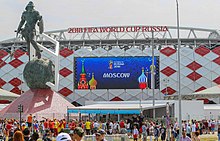
Twelve stadiums in eleven Russian cities were built or renovated for the FIFA World Cup. Between 2010 (when Russia were announced as hosts) and 2018, nine of the twelve stadiums were built (some in place of older, outdated venues) and the other three were renovated for the tournament.[94]
- Kaliningrad: Kaliningrad Stadium (new). The first piles were driven into the ground in September 2015. On 11 April 2018 it hosted its first match.
- Kazan: Kazan Arena (new). The stadium was built for the 2013 Summer Universiade. It has since hosted the 2015 World Aquatics Championships and the 2017 FIFA Confederations Cup. It serves as a home arena for FC Rubin Kazan.
- Moscow: Luzhniki Stadium (heavily renovated). The largest stadium in the country, it was closed for renovation in 2013. It was commissioned in November 2017.
- Moscow: Spartak Stadium (new). This stadium is the home arena to its namesake FC Spartak Moscow. In accordance with FIFA requirements, during the 2018 World Cup, it was called Spartak Stadium instead of its usual name Otkritie Arena. It hosted its first match on 5 September 2014.
- Nizhny Novgorod: Nizhny Novgorod Stadium (new). Construction of this stadium commenced in 2015 and was completed in December 2017.[95]
- Rostov-on-Don: Rostov Arena (new). The stadium is located on the left bank of the Don. Construction was completed on 22 December 2017.
- Saint Petersburg: Saint Petersburg Stadium (new). Construction commenced in 2007 after the site, formerly occupied by Kirov Stadium, was cleared. The project was officially completed on 29 December 2016.[96] It has hosted 2017 FIFA Confederations Cup games and served as a venue for UEFA Euro 2020.
- Samara: Samara Arena (new). Construction officially started on 21 July 2014 and was completed on 21 April 2018.
- Saransk: Mordovia Arena (new). The stadium in Saransk was scheduled to be commissioned in 2012 in time for the opening of the all-Russian Spartakiad, but the plan was revised. The opening was rescheduled to 2017. The arena hosted its first match on 21 April 2018.
- Sochi: Fisht Stadium (slightly renovated). This stadium hosted the opening and closing ceremonies of the 2014 Winter Olympics. Afterwards, it was renovated in preparation for the 2017 FIFA Confederations Cup and the 2018 World Cup.
- Volgograd: Volgograd Arena (new). The main Volgograd arena was built on the demolished Central Stadium site, at the foot of the Mamayev Kurgan memorial complex. It was commissioned on 3 April 2018.[97]
- Yekaterinburg: Ekaterinburg Arena (heavily renovated). The Central Stadium of Yekaterinburg had been renovated for the FIFA World Cup. Its stands have a capacity of 35,000 spectators. The renovation project was completed in December 2017.
| Moscow | Saint Petersburg | Sochi | |
|---|---|---|---|
| Luzhniki Stadium | Otkritie Arena (Spartak Stadium) | Krestovsky Stadium (Saint Petersburg Stadium) | Fisht Olympic Stadium (Fisht Stadium) |
| Capacity: 78,011[98] | Capacity: 44,190[99] | Capacity: 64,468[100] | Capacity: 44,287[101] |
 |  |  |  |
| Volgograd | Rostov-on-Don | ||
| Volgograd Arena | Rostov Arena | ||
| Capacity: 43,713[102] | Capacity: 43,472[103] | ||
 | 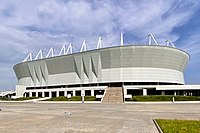 | ||
| Nizhny Novgorod | Kazan | ||
| Nizhny Novgorod Stadium | Kazan Arena | ||
| Capacity: 43,319[104] | Capacity: 42,873[105] | ||
 |  | ||
| Samara | Saransk | Kaliningrad | Yekaterinburg |
| Samara Arena | Mordovia Arena | Kaliningrad Stadium | Central Stadium (Ekaterinburg Arena) |
| Capacity: 41,970[106] | Capacity: 41,685[107] | Capacity: 33,973[108] | Capacity: 33,061[109] |
 | 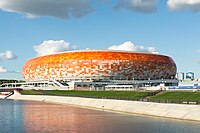 | 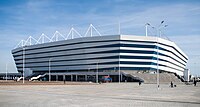 |  |
Team base camps
[edit]Base camps were used by the 32 national squads to stay and train before and during the World Cup tournament. On 9 February 2018, FIFA announced the base camps for each participating team.[110]
- Argentina: Bronnitsy, Moscow Oblast
- Australia: Kazan, Tatarstan
- Belgium: Krasnogorsky, Moscow Oblast
- Brazil: Sochi, Krasnodar Krai
- Colombia: Verkhneuslonsky, Tatarstan
- Costa Rica: Saint Petersburg
- Croatia: Roshchino, Leningrad Oblast[111]
- Denmark: Anapa, Krasnodar Krai
- Egypt: Grozny, Chechnya
- England: Repino, Saint Petersburg[112]
- France: Istra, Moscow Oblast
- Germany: Vatutinki, Moscow[113]
- Iceland: Gelendzhik, Krasnodar Krai
- Iran: Bakovka, Moscow Oblast
- Japan: Kazan, Tatarstan
- Mexico: Khimki, Moscow Oblast
- Morocco: Voronezh, Voronezh Oblast
- Nigeria: Yessentuki, Stavropol Krai
- Panama: Saransk, Mordovia
- Peru: Moscow
- Poland: Sochi, Krasnodar Krai
- Portugal: Ramenskoye, Moscow Oblast
- Russia: Khimki, Moscow Oblast
- Saudi Arabia: Saint Petersburg
- Senegal: Kaluga, Kaluga Oblast
- Serbia: Svetlogorsk, Kaliningrad Oblast
- South Korea: Saint Petersburg
- Spain: Krasnodar, Krasnodar Krai
- Sweden: Gelendzhik, Krasnodar Krai
- Switzerland: Togliatti, Samara Oblast
- Tunisia: Pervomayskoye, Moscow Oblast
- Uruguay: Bor, Nizhny Novgorod Oblast
Preparation and costs
[edit]Budget
[edit]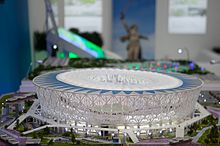
At an estimated cost of over $14.2 billion as of June 2018[update],[114] the 2018 FIFA event was the most expensive World Cup in history, surpassing the $11.6 billion cost of the 2014 FIFA World Cup in Brazil.[114][115]
The Russian government had originally earmarked a budget of around $20 billion,[116] which was later slashed to $10 billion, for World Cup preparations. Half was spent on transportation infrastructure.[117] As part of the program to prepare for the 2018 FIFA World Cup, a federal sub-program—"Construction and Renovation of Transport Infrastructure"—was implemented with a total budget of ₽352.5 billion (rubles), with ₽170.3 billion coming from the federal budget, ₽35.1 billion from regional budgets, and ₽147.1 billion from investors.[118] The biggest item of federal spending was the aviation infrastructure costing ₽117.8 billion.[119] Construction of new hotels was a crucial area of infrastructure development in World Cup host cities. Costs continued to mount as preparations were underway.[115]
Infrastructure spending
[edit]Platov International Airport in Rostov-on-Don was upgraded with automated air traffic control systems. Modern surveillance, navigation, communication, control, and meteorological support systems were also installed.[120] Koltsovo Airport in Yekaterinburg was upgraded with radio-engineering tools for flight operation and received a second runway. Saransk Airport received a new navigation system; two new hotels were constructed in the city—the Mercure Saransk Centre (Accor Hotels) and Four Points by Sheraton Saransk as well as few other smaller accommodation facilities.[121] In Samara, new tram lines were laid.[122] Khrabrovo Airport in Kaliningrad was upgraded with radio navigation and weather equipment.[123] Renovation and upgraded radio-engineering tools for flight operations was completed in the Moscow, Saint Petersburg, Volgograd, Samara, Yekaterinburg, Kazan and Sochi airports.[120] On 27 March, the Russian Ministry of Construction Industry, Housing and Utilities Sector of reported that all communications within its area of responsibility had been commissioned. The last facility commissioned was a waste treatment station in Volgograd. In Yekaterinburg, where four matches were hosted, hosting costs increased to over ₽7.4 billion, exceeding the ₽5.6 billion rubles originally allocated from the state and regional budget.[124]
Volunteers
[edit]
Volunteer applications to the 2018 Russia Local Organising Committee opened on 1 June 2016. The 2018 FIFA World Cup Russia Volunteer Program received about 177,000 applications,[125] and engaged a total of 35,000 volunteers.[126] They received training at 15 Volunteer Centres of the local organising committee based in 15 universities, and in volunteer centres in the host cities. Preference, especially in key areas, was given to those with knowledge of a foreign language and volunteering experience, but not necessarily to Russian nationals.[127]
Transport
[edit]Free public transport services were offered for ticketholders during the World Cup, including additional trains linking host cities, as well as services such as bus services within them.[128][129][130]
Schedule
[edit]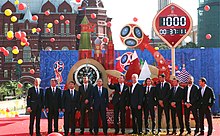
The full schedule was announced by FIFA on 24 July 2015 without kick-off times, which were confirmed later.[131][132] On 1 December 2017, following the final draw, FIFA adjusted six kick-off times.[133][134]
Russia was placed in position A1 in the group stage and played in the opening match at the Luzhniki Stadium in Moscow on 14 June against Saudi Arabia, the two lowest-ranked teams of the tournament at the time of the final draw.[135] The Luzhniki Stadium also hosted the second semi-final on 11 July and the final on 15 July. The Krestovsky Stadium in Saint Petersburg hosted the first semi-final on 10 July and the third place play-off on 14 July.[136][52]
Opening ceremony
[edit]
The opening ceremony took place on Thursday, 14 June 2018, at the Luzhniki Stadium in Moscow, preceding the opening match of the tournament between hosts Russia and Saudi Arabia.[137][138]
At the start of the ceremony, Russian president Vladimir Putin gave a speech, welcoming the countries of the world to Russia and calling football a uniting force.[139] Brazilian World Cup-winning striker Ronaldo entered the stadium with a child in a Russia jersey.[139] Pop singer Robbie Williams then sang two of his songs solo before he and Russian soprano Aida Garifullina performed a duet.[139] Dancers dressed in the flags of the 32 competing teams appeared carrying a sign with the name of each nation.[139] At the end of the ceremony Ronaldo reappeared with the official match ball which had returned from the International Space Station in early June.[139]
Young participants of the international children's social programme Football for Friendship from 211 countries and regions took part in the opening ceremony of the FIFA World Cup at the Luzhniki stadium.[140]
Group stage
[edit]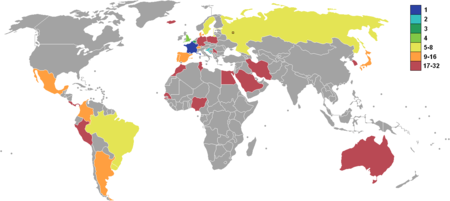
Competing countries were divided into eight groups of four teams (groups A to H). Teams in each group played one another in a round-robin, with the top two teams advancing to the knockout stage. Ten European teams and four South American teams progressed to the knockout stage, together with Japan and Mexico.
For the first time since 1938, Germany, the reigning champions, were eliminated in the first round. This was the third consecutive tournament in which the holders were eliminated in the first round, after Italy in 2010 and Spain in 2014. No African team progressed to the second round for the first time since 1982. The fair play criteria came into use for the first time when Japan qualified over Senegal because the team had received fewer yellow cards. Only one match, France versus Denmark, was goalless. Until then there were a record 36 straight games in which at least one goal was scored.[141] All times listed below are local time.[133]
| Tie-breaking criteria for group play |
|---|
The ranking of teams in the group stage was determined as follows:[68][142]
|
Group A
[edit]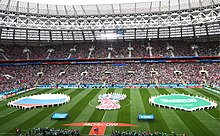
| Pos | Team | Pld | W | D | L | GF | GA | GD | Pts | Qualification |
|---|---|---|---|---|---|---|---|---|---|---|
| 1 | 3 | 3 | 0 | 0 | 5 | 0 | +5 | 9 | Advance to knockout stage | |
| 2 | 3 | 2 | 0 | 1 | 8 | 4 | +4 | 6 | ||
| 3 | 3 | 1 | 0 | 2 | 2 | 7 | −5 | 3 | ||
| 4 | 3 | 0 | 0 | 3 | 2 | 6 | −4 | 0 |
| Saudi Arabia | 2–1 | |
|---|---|---|
| Report |
|
Group B
[edit]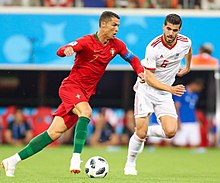
| Pos | Team | Pld | W | D | L | GF | GA | GD | Pts | Qualification |
|---|---|---|---|---|---|---|---|---|---|---|
| 1 | 3 | 1 | 2 | 0 | 6 | 5 | +1 | 5 | Advance to knockout stage | |
| 2 | 3 | 1 | 2 | 0 | 5 | 4 | +1 | 5 | ||
| 3 | 3 | 1 | 1 | 1 | 2 | 2 | 0 | 4 | ||
| 4 | 3 | 0 | 1 | 2 | 2 | 4 | −2 | 1 |
Group C
[edit]
| Pos | Team | Pld | W | D | L | GF | GA | GD | Pts | Qualification |
|---|---|---|---|---|---|---|---|---|---|---|
| 1 | 3 | 2 | 1 | 0 | 3 | 1 | +2 | 7 | Advance to knockout stage | |
| 2 | 3 | 1 | 2 | 0 | 2 | 1 | +1 | 5 | ||
| 3 | 3 | 1 | 0 | 2 | 2 | 2 | 0 | 3 | ||
| 4 | 3 | 0 | 1 | 2 | 2 | 5 | −3 | 1 |
Group D
[edit]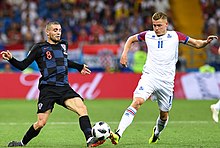
| Pos | Team | Pld | W | D | L | GF | GA | GD | Pts | Qualification |
|---|---|---|---|---|---|---|---|---|---|---|
| 1 | 3 | 3 | 0 | 0 | 7 | 1 | +6 | 9 | Advance to knockout stage | |
| 2 | 3 | 1 | 1 | 1 | 3 | 5 | −2 | 4 | ||
| 3 | 3 | 1 | 0 | 2 | 3 | 4 | −1 | 3 | ||
| 4 | 3 | 0 | 1 | 2 | 2 | 5 | −3 | 1 |
| Argentina | 0–3 | |
|---|---|---|
| Report |
Group E
[edit]
| Pos | Team | Pld | W | D | L | GF | GA | GD | Pts | Qualification |
|---|---|---|---|---|---|---|---|---|---|---|
| 1 | 3 | 2 | 1 | 0 | 5 | 1 | +4 | 7 | Advance to knockout stage | |
| 2 | 3 | 1 | 2 | 0 | 5 | 4 | +1 | 5 | ||
| 3 | 3 | 1 | 0 | 2 | 2 | 4 | −2 | 3 | ||
| 4 | 3 | 0 | 1 | 2 | 2 | 5 | −3 | 1 |
| Costa Rica | 0–1 | |
|---|---|---|
| Report |
|
Group F
[edit]
| Pos | Team | Pld | W | D | L | GF | GA | GD | Pts | Qualification |
|---|---|---|---|---|---|---|---|---|---|---|
| 1 | 3 | 2 | 0 | 1 | 5 | 2 | +3 | 6 | Advance to knockout stage | |
| 2 | 3 | 2 | 0 | 1 | 3 | 4 | −1 | 6 | ||
| 3 | 3 | 1 | 0 | 2 | 3 | 3 | 0 | 3 | ||
| 4 | 3 | 1 | 0 | 2 | 2 | 4 | −2 | 3 |
| South Korea | 1–2 | |
|---|---|---|
| Report |
| South Korea | 2–0 | |
|---|---|---|
| Report |
Group G
[edit]
| Pos | Team | Pld | W | D | L | GF | GA | GD | Pts | Qualification |
|---|---|---|---|---|---|---|---|---|---|---|
| 1 | 3 | 3 | 0 | 0 | 9 | 2 | +7 | 9 | Advance to knockout stage | |
| 2 | 3 | 2 | 0 | 1 | 8 | 3 | +5 | 6 | ||
| 3 | 3 | 1 | 0 | 2 | 5 | 8 | −3 | 3 | ||
| 4 | 3 | 0 | 0 | 3 | 2 | 11 | −9 | 0 |
